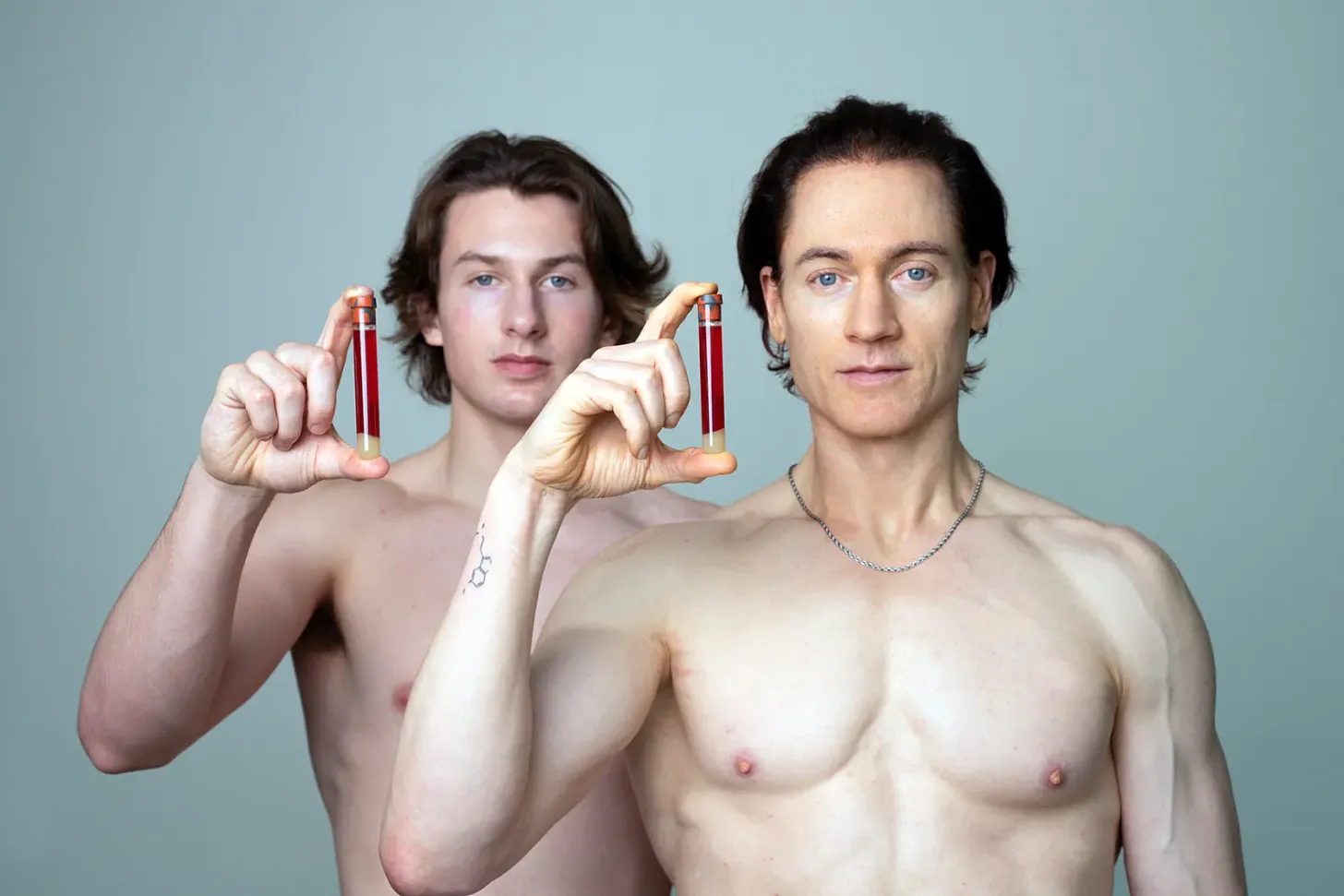In today’s world, the pursuit of eternal youth and the desire to live a longer, healthier life has become more than just a trend—it’s a global obsession. Scientific advances, new health technologies, and a rising interest in wellness have made the concept of longevity a central focus for millions of people worldwide. It’s no longer enough to simply grow old with dignity. Instead, there is an increasing desire to maintain vitality, youthfulness, and health for as long as possible. In this digital age, the quest for longevity has intensified, with people seeking not only to extend their lives but to enhance the quality of their years. This obsession has given rise to a wide array of supplements, medical treatments, and lifestyle practices designed to prolong life and delay the inevitable signs of aging.
Why Aging Gracefully Is No Longer Enough
Aging gracefully was once the ultimate ideal for those looking to embrace the natural process of growing older. It was about accepting the physical changes that come with age and adjusting to the inevitable slowing of the body and mind. However, this mindset has dramatically shifted over recent decades. Today, people are no longer content with merely aging with grace. The cultural emphasis has now moved towards aging with vitality, remaining youthful in both appearance and health. With technological innovations and scientific breakthroughs continually emerging, society is beginning to believe that aging doesn’t have to be synonymous with decline. People want more than just to gracefully accept aging—they want to defy it.
This shift in mentality has driven the rise of anti-aging products, from skincare treatments to advanced supplements, as well as a growing focus on staying fit and healthy as we age. People are now actively seeking out ways to preserve their energy, cognitive function, and physical vitality into their later years. Aging with grace is no longer enough—it’s about staying young in body and mind, defying the stereotypes of aging, and living well beyond our years.
The Rise of “Healthspan” as the New Lifespan
While many focus on longevity, the concept of “healthspan” is rapidly gaining popularity. Healthspan refers to the portion of an individual’s life during which they are in good health, free from chronic diseases, disabilities, or major health issues. Rather than merely focusing on the length of one’s life—known as lifespan—the idea of healthspan emphasizes living longer without the suffering that often comes with old age.
This shift in focus is partly due to scientific advances that show how chronic diseases and health issues, like diabetes, heart disease, and neurodegenerative disorders, can be delayed or even prevented through proper lifestyle choices, medical intervention, and the use of certain supplements. Healthspan is increasingly seen as the key to longevity, as people are seeking ways to extend their healthy years rather than simply extending life itself. The idea is that quality of life matters just as much—if not more—than the number of years one lives. Scientists and health experts are now exploring ways to expand the healthspan, providing new hope that the later years of life can be lived with vitality and well-being.
Google as the Crystal Ball: What the Searches Reveal
In the digital era, Google is more than just a search engine—it has become a reflection of global curiosity, desires, and fears. Every search made on Google generates data, revealing trends and patterns that offer valuable insights into what people around the world are thinking and feeling. By analyzing these trends, we can begin to understand the collective psyche of humanity, uncovering not just what people are interested in, but what they care about most. In a sense, Google has become a modern-day crystal ball, providing us with a glimpse into the evolving landscape of human thought, including our desires and concerns surrounding longevity, health, and well-being.
The Digital Pulse of Global Curiosity
Google searches serve as a digital pulse, capturing real-time global curiosity. The data collected from billions of searches allows us to see what people are thinking, what they care about, and what is capturing their attention at any given moment. For example, when major events occur—such as a health crisis, political upheaval, or new scientific discoveries—search trends reflect these shifts. Google searches act as a barometer, showing the world’s immediate response to global happenings and offering valuable insights into the topics that dominate people’s thoughts.
One of the most fascinating aspects of Google search data is how it uncovers the unique interests and concerns of different regions and demographics. While global trends emerge, local nuances also come to light. This variation helps us better understand the cultural diversity of interests, needs, and concerns, from the search for information about aging and longevity to specific health concerns that may be more prevalent in one area of the world over another.
How Search Trends Expose Our Inner Health Fantasies
Beyond the global curiosity about current events, Google search trends often reveal deeper, more personal desires, anxieties, and even fantasies related to health and wellness. With the rise of the wellness industry and growing concerns about aging, people are increasingly turning to Google to search for ways to maintain their youth, improve their health, and fight the effects of aging.
One of the most telling trends is the search for miracle cures or anti-aging treatments. From “how to prevent wrinkles” to “how to live forever,” these types of queries expose a collective yearning for eternal youth and vitality. While some of these searches reflect legitimate concerns about aging, others point to the unrealistic ideals set by social media influencers, beauty standards, and the wellness industry. What people search for on Google offers a window into their innermost health fantasies—whether it’s the desire for miraculous supplements, age-reversing beauty routines, or life-extending breakthroughs.
These trends reflect a culture that increasingly seeks control over health and appearance, often driven by the influence of social media, advertising, and cultural expectations. Google’s search data provides valuable insights into how society views health and longevity, and how these views shape our behaviors, desires, and the choices we make regarding health practices.
The Stars of Longevity: Supplements the World Can’t Stop Googling
In the quest for longevity, one of the most prominent areas of interest is the supplement industry. People are constantly searching for ways to improve their health, boost their energy, and extend their lifespan. As a result, certain supplements have become stars in the longevity world, gaining widespread attention and popularity through Google searches. These supplements promise to slow down aging, improve healthspan, and even reverse the signs of aging. But how much of this is based on science, and how much is fueled by consumer desire?
NMN: The Fountain of Youth in a Pill?
Nicotinamide mononucleotide (NMN) has become one of the most popular supplements in the world of longevity. NMN is believed to increase levels of nicotinamide adenine dinucleotide (NAD+), a molecule involved in cellular energy production and repair. As we age, NAD+ levels naturally decline, which is thought to contribute to aging and age-related diseases. By boosting NAD+ levels, NMN promises to enhance cellular repair, improve energy levels, and potentially slow down the aging process. Searches for NMN have surged, as more people are looking to this supplement as a potential “fountain of youth” in a pill.
Resveratrol: Can Wine’s Magic Molecule Deliver?
Resveratrol, a compound found in red wine, has long been touted for its anti-aging properties. This antioxidant is believed to activate certain genes that promote longevity and protect against age-related diseases. While the idea of drinking wine for health benefits is appealing, research on resveratrol’s effectiveness in humans is still ongoing. Nonetheless, the popularity of this supplement continues to rise, as more people search for ways to incorporate its potential benefits into their lives.
Collagen: Skin Deep or Deeper Than Skin?
Collagen is the most abundant protein in our bodies, responsible for maintaining skin elasticity and joint health. As we age, collagen production decreases, leading to wrinkles, sagging skin, and joint pain. As a result, collagen supplements have become a go-to for those seeking to combat signs of aging. While research shows that collagen supplements can help improve skin elasticity and reduce joint pain, the full extent of their benefits is still being explored. Collagen remains one of the most searched-for supplements in the longevity market, with people hoping to preserve their youthful appearance and maintain joint health.
CoQ10: Powering Cells, Sparking Curiosity
Coenzyme Q10 (CoQ10) is a molecule found in every cell of the body, playing a crucial role in energy production. As we age, our CoQ10 levels naturally decline, which can contribute to fatigue, muscle weakness, and age-related diseases. CoQ10 supplements are believed to help restore energy levels, improve heart health, and slow down the aging process. The surge in CoQ10 searches reflects growing interest in this supplement as a way to boost vitality and maintain energy levels as we age.
Fisetin: A Quiet Revolution in Cellular Cleanup
Fisetin, a flavonoid found in fruits and vegetables, has been gaining attention as a powerful antioxidant and anti-inflammatory agent. Research suggests that fisetin may help clear damaged cells, reduce inflammation, and protect against age-related diseases. As more people search for ways to improve cellular health, fisetin is emerging as a promising supplement in the longevity world. Its ability to combat aging at the cellular level has sparked curiosity and interest, positioning it as one of the rising stars in the supplement market.
Unlikely Heroes: The Weird and Wonderful Search Surges
While mainstream supplements dominate the longevity market, some unusual and lesser-known substances are also gaining attention. These “unlikely heroes” are often driven by emerging trends, curiosity, or cultural fascination, and their popularity is reflected in search surges on Google. From ancient herbs to exotic mushrooms, these strange and wonderful substances offer a unique perspective on how people are seeking to extend their healthspan.
Mushrooms for Immortality: Lion’s Mane and Reishi
Mushrooms like lion’s mane and reishi have become increasingly popular in the wellness world due to their potential cognitive and health benefits. Lion’s mane is believed to support brain health by stimulating the growth of nerve cells, while reishi is known for its immune-boosting properties. As interest in alternative health solutions grows, these mushrooms have gained significant search attention, with people looking for natural ways to enhance brain function, boost immunity, and potentially slow the effects of aging.
Forgotten Ancient Herbs Making a Modern Comeback
Ancient herbs like ashwagandha, ginseng, and turmeric have seen a resurgence in popularity in recent years. These herbs, which have been used for centuries in traditional medicine, are now being explored for their potential anti-aging and health benefits. From reducing stress to improving cognitive function, these herbs are often touted as natural ways to extend healthspan. The rising interest in these herbs is reflected in search trends, as people seek to reconnect with ancient wisdom in the quest for longevity.
Biohackers’ Secret Stashes
Biohacking, the practice of using science and technology to optimize health, has led to a rise in unconventional supplements and health practices. Biohackers are constantly searching for new ways to extend their healthspan, often experimenting with novel supplements, nootropics, and lifestyle interventions. These “secret stashes” of biohackers have sparked curiosity among the public, as more people seek to explore cutting-edge methods for improving their health and longevity. Google searches related to biohacking trends highlight the growing interest in this alternative approach to wellness.
The Psychology of Longevity Searches
As the search for longevity intensifies, it’s important to consider the psychological factors driving these search trends. People’s desires for longer, healthier lives are often fueled by a complex blend of fear, hope, and social influence. By understanding the psychology behind longevity searches, we can gain a better understanding of why people are so eager to find the “secret” to eternal youth and health.
Fear, Hope, and the Quest for a Longer Tomorrow
Fear of aging and death is a natural part of the human experience. The desire to defy the aging process, or at least delay it, stems from a deep-seated fear of growing old and the inevitable decline that comes with it. At the same time, there is hope—hope that science, technology, and modern medicine can provide solutions that will allow us to live longer, healthier lives. This combination of fear and hope fuels the growing obsession with longevity, driving people to search for the latest anti-aging trends, supplements, and health hacks.
How FOMO Shapes the Supplement Market
The fear of missing out (FOMO) is a powerful psychological force that drives people to follow trends, adopt new practices, and try out the latest products. In the world of longevity, FOMO has created a sense of urgency, pushing individuals to search for the next big thing in supplements, even if the science behind these products is still emerging. As influencers and celebrities promote the latest anti-aging solutions, people are increasingly eager to jump on the bandwagon, hoping to reap the benefits before it’s too late.
The Global Flavor of Longevity Trends
While the obsession with longevity is global, there are distinct regional variations in how people approach the search for health and longevity. These differences are often shaped by cultural traditions, local diets, and access to healthcare and wellness resources.
Why the West Googles Molecules and the East Googles Roots
In the West, the focus tends to be on molecular compounds and scientific innovations, such as supplements like NMN, resveratrol, and CoQ10. These molecules promise to slow down aging and improve overall health. In contrast, Eastern cultures, particularly in Asia, often turn to traditional herbal remedies and plant-based ingredients, such as ginseng, turmeric, and goji berries, for their health benefits. The difference in search behavior reflects these cultural approaches to health and longevity.
Surprising Hotspots for Longevity Searches
Certain countries and regions are more actively searching for longevity-related information than others. For example, Japan, a country known for its high life expectancy, has become a hotspot for longevity searches, with people there seeking information about the latest health trends, supplements, and medical treatments. Similarly, countries with large wellness industries, like the United States, are seeing an increase in searches related to anti-aging products and longevity solutions.
Social Media Alchemy: Turning Supplements into Gold
Social media has played a huge role in shaping modern health trends, including those related to longevity. Influencers, bloggers, and TikTok personalities have the power to turn a little-known supplement into a global sensation overnight. This phenomenon has had a profound impact on the supplement market, as social media platforms become powerful tools for driving search behavior and influencing consumer choices.
How Influencers and TikTok Trends Redefine “Must-Haves”
Social media influencers, especially on platforms like Instagram and TikTok, have the ability to popularize specific supplements, diets, and health trends. With millions of followers, these influencers can generate viral trends that lead to search surges for products like collagen, NMN, and other anti-aging supplements. The power of these trends is undeniable, as people look to social media for the latest recommendations on how to improve their health and defy the aging process.
Viral Pills vs. Science-Based Choices
While social media trends can drive the popularity of certain supplements, there is often a disconnect between viral products and scientifically-backed choices. The rise of “viral pills” based on influencer promotions has led some people to make health decisions based on trends rather than evidence-based research. As a result, consumers may be drawn to supplements with limited scientific support, often making choices based on FOMO or peer influence.
The Science vs. the Hype: Are We Being Googled into Belief?
As more people search for the latest longevity solutions, it’s important to question whether the supplements and health trends they find are backed by science or driven by hype. The rapid rise of longevity-related searches has led to a flood of information—both accurate and misleading—leaving consumers to sift through claims of miracle cures and age-reversing products.
What Research Really Says About the Most-Searched Supplements
While many of the most-searched supplements have shown promise in preliminary studies, the full scientific consensus is often lacking. For example, while NMN and resveratrol have demonstrated potential in animal studies, human trials are still ongoing. The gap between hype and science can lead to misinformation, making it difficult for consumers to make informed decisions about the supplements they take.
Spotlight on Pseudoscience: The Danger of Search-Driven Choices
The rise of search-driven health trends also raises the risk of pseudoscience taking hold. With so much information available online, some companies exploit search behavior to promote unproven or even dangerous products. This makes it essential for consumers to approach longevity trends with a critical eye, distinguishing between science-based solutions and products driven by marketing gimmicks and unrealistic promises.
The Future of Longevity: What the Trends Predict
Looking ahead, the future of longevity is poised to be shaped by emerging technologies and groundbreaking research. From personalized medicine to AI-powered health solutions, the next wave of longevity trends promises to revolutionize the way we approach aging and health.
From Custom Pills to DNA-Driven Health Hacks
Advances in genetic research are paving the way for personalized health solutions that cater to individual needs and genetic predispositions. In the future, we may see custom-designed supplements tailored to an individual’s DNA, lifestyle, and health goals. These personalized solutions could offer a more targeted and effective approach to extending healthspan and lifespan.
The Next Wave: AI-Powered Supplements
Artificial intelligence (AI) is also making waves in the longevity space, with companies exploring how AI can help design supplements and health interventions tailored to individual needs. AI-powered supplements could become the next big trend in longevity, offering highly personalized health solutions that go beyond the one-size-fits-all approach of traditional supplements.
The Dark Side of Longevity Obsession
While the desire to live longer and healthier lives is understandable, the obsession with longevity can have negative consequences. The rise of the supplement industry and the relentless search for miracle cures can lead to unrealistic expectations, financial strain, and even health risks.
Supplement Addiction: When Google Becomes Your Doctor
For some, the search for longevity can become an obsession. The constant pursuit of the next best supplement or health trend can lead to supplement addiction, where individuals rely on pills and potions to maintain their health rather than adopting a more balanced approach. This addiction to supplements can become detrimental to both physical and mental health, especially when individuals are swayed by online trends rather than expert guidance.
The Ethics of Selling Hope in Capsules
The marketing of longevity supplements often plays on people’s deepest fears and desires. By promising miraculous results, companies can capitalize on the hope for eternal youth and health. However, this business model raises ethical concerns, particularly when unproven or dangerous products are sold as life-changing solutions.
Longevity Cheat Codes: What’s Actually Worth Trying
Amidst the sea of supplements and health trends, it can be difficult to discern which products and practices are genuinely effective in extending healthspan and lifespan. There are some supplements and habits, however, that show promise based on scientific research.
Supplements with Promise (and the Studies to Back Them)
While the world of longevity supplements is filled with fads, there are a few options that have garnered attention due to scientific research supporting their benefits. Supplements like vitamin D, omega-3 fatty acids, and magnesium have shown positive effects on health, longevity, and disease prevention. These evidence-backed options are worth considering for anyone looking to improve their overall health.
Simple Habits That Outperform Your Supplement Cabinet
While supplements can play a role in supporting health, they are not a replacement for a healthy lifestyle. Simple habits like regular exercise, a balanced diet, quality sleep, and stress management can have a far greater impact on longevity than any supplement. In many cases, these lifestyle changes outperform supplements in improving both the length and quality of life.
Conclusion: Searching for Time in the Digital Age
In the digital age, our search for longevity has become intertwined with our search for meaning, health, and well-being. Google searches reveal a global obsession with finding ways to extend life, improve healthspan, and defy the aging process. However, in our pursuit of eternal youth, it’s important to remember that the best things in life aren’t always found through a Google search. Longevity is not just about taking supplements or following the latest trends—it’s about making informed choices, living a balanced life, and embracing the passage of time with gratitude and purpose. True health and well-being come from within, and no search engine can provide the answers to life’s most profound questions.




